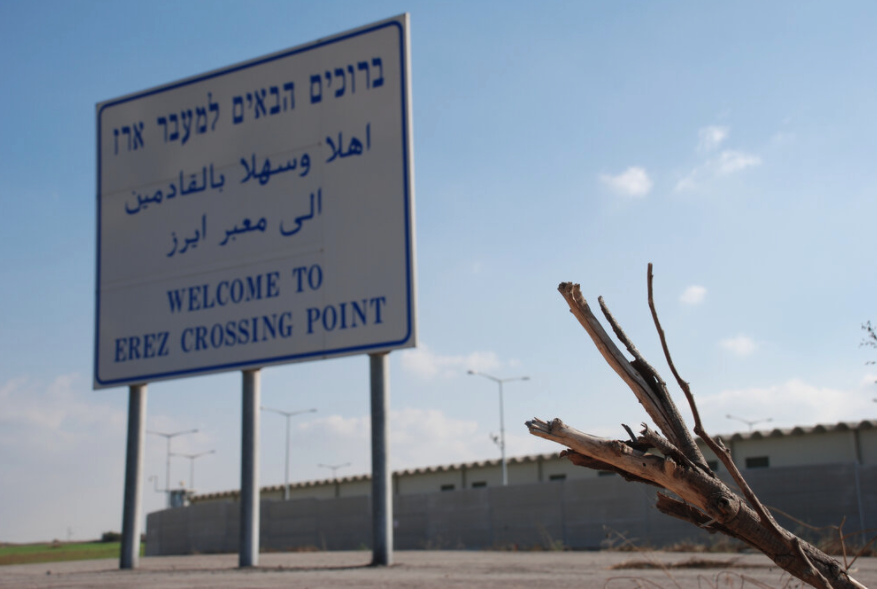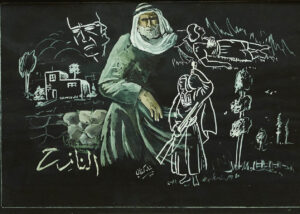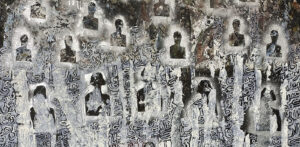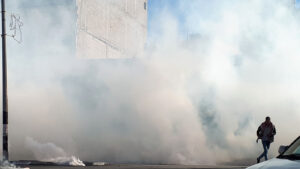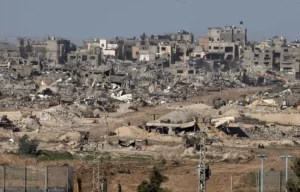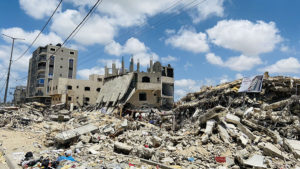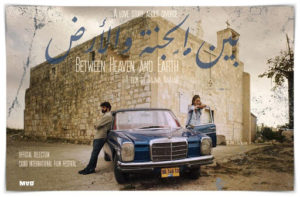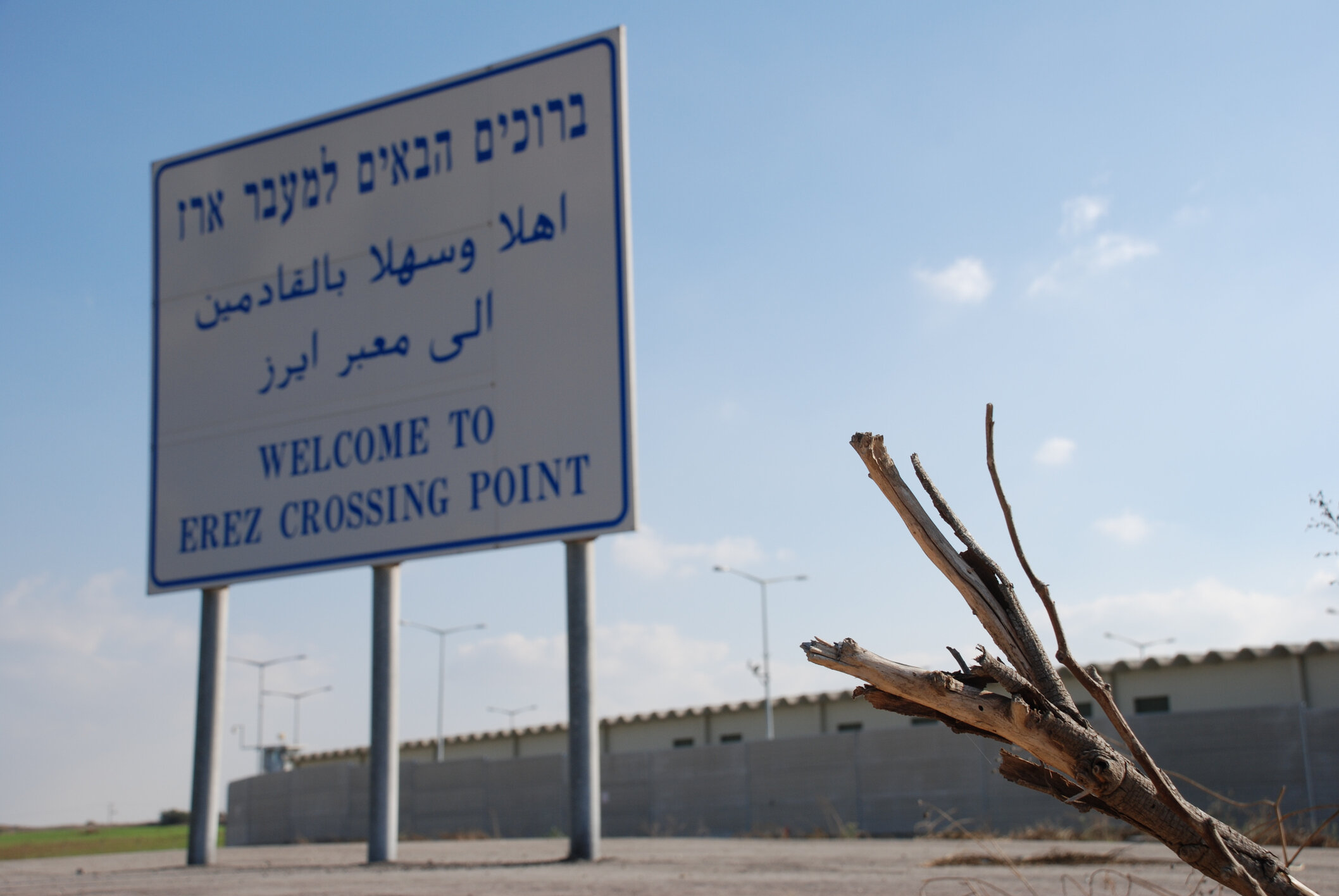
“If only it would just sink into the sea,” Prime Minister Yitzhak Rabin despaired just before signing the 1993 Oslo Accord.[1] Although Israel had always coveted Gaza, its stubborn resistance eventually caused the occupier to sour on the Strip.
Gaza, as former British prime minister David Cameron observed, is an “open-air prison.” The Israeli warden is in charge. In the popular imagination confected by state propaganda, and dutifully echoed by everyone else in authority, Israel is almost always reacting to or retaliating against “terrorism.” But neither the inhuman and illegal blockade Israel imposed on Gaza nor the periodic murderous “operations” Israel has unleashed against it trace back to Hamas rocket fire. These were Israeli political decisions springing from Israeli political calculations, in which Hamas military actions figured as a null factor. In fact, Israel more often than not reacted to Hamas inaction: the Islamic movement refused to provide the “terrorist” pretext Israel sought in order to launch an operation, the predicate of which was political, not military (self-defense). Of course, if Gaza “would just sink into the sea,” or if it unilaterally surrendered its destiny to Israeli caprice, Israel wouldn’t brutalize it. But short of these options, Gaza could only exercise as much, that is, as little, agency as is allocated to any people held in bondage. The notion that enhanced fireworks emanating from an anthill could, in and of themselves, inflect state policy of one of the world’s most formidable military powers is laughable — or would be, were it not for that power’s formidable disinformation apparatus.
If Gaza survives, it’s because of foreign subventions delivered in synchrony with the occasional loosening — to sycophantic international fanfare — of an Israeli screw. Indeed, the paradox is that as each new economic report is churned out, the day of Gaza’s complete “de-development” draws nearer. It is also hard to resist the thought that Gaza would have benefited more if the time, energy, and expense invested in these meticulous reports replete with mind-numbing minutiae had simply been channeled into an open-air swimming pool, inside the open-air prison, for Gaza’s bereft children. Still, they constitute an ineffaceable record of and testament to the horror that has been inflicted on Gaza. They are an eternal monument to the martyrs and an eternal accusation against their tormenters. The human rights reportage on Gaza mirrors the content and has suffered the fate of these economic reports. The sheer number of human rights reports could by now fill a medium-sized library; they have generally upheld exacting standards of accuracy, and they record a ghastly tale of suffering and misery, on the one hand, and criminal excess and heartlessness, on the other. But they have been largely ignored outside a narrow cadre of specialists, and in the end the human rights community itself succumbed to the Israeli juggernaut. All the same, the reports constitute the essential resource for those who care about truth and for whom truth is precious, while even if mostly underutilized, they are the most potent weapon in the arsenal of those who hope against hope to mobilize public opinion so as to salvage a modicum of justice.
What has befallen Gaza is a human-made human disaster. In its protractedness and in its starkness, in its unfolding not in the fog of war or in the obscurity of remoteness but in broad daylight and in full sight, in the complicity of so many, not just via acts of commission but also, and especially, of omission, it is moreover a distinctively evil crime. Readers will be able to judge for themselves whether this depiction is naïve or whether the documentary record bears it out; whether this writer is partisan to Gaza or whether the facts are partisan to it; whether Gaza poses the challenge of competing “narratives,” or whether it poses the challenge of disengaging its innocence from the skein of lies concealing it. It might be politically prudent to expatiate on the complexity of Gaza. But it would also be a moral cop-out. For Gaza is about a Big Lie composed of a thousand, often seemingly abstruse and arcane, little lies.
In April 2004, Prime Minister Ariel Sharon announced that Israel would “disengage” from Gaza, and by September 2005 both Israeli troops and Jewish settlers had been pulled out. It would relieve international pressure on Israel and consequently “freez[e]…the political process,” a close advisor to Sharon explained, laying out the rationale behind the disengagement. “And when you freeze that process you prevent the establishment of a Palestinian state.” Harvard political economist Sara Roy observed that “with the disengagement from Gaza, the Sharon government was clearly seeking to preclude any return to political negotiations…while preserving and deepening its hold on Palestine.”[2] Israel subsequently declared that it was no longer the occupying power in Gaza. However, human rights organizations and international institutions rejected this contention because, in myriad ways, Israel still preserved near-total dominance of the Strip. “Whether the Israeli army is inside Gaza or redeployed around its periphery,” Human Rights Watch (HRW) concluded, “it remains in control.”[3] Indeed, Israel’s own leading authority on international law, Yoram Dinstein, aligned himself with the “prevalent opinion” that the Israeli occupation of Gaza was not over.[4]
In January 2006, disgusted by years of official corruption and fruitless negotiations, Palestinians elected the Islamic movement Hamas into office. Israel immediately tightened its blockade of Gaza, and the US joined in. It was demanded of the newly elected government that it renounce violence, and recognize Israel as well as prior Israeli-Palestinian agreements. These preconditions for international engagement were unilateral, not reciprocal. Israel wasn’t required to renounce violence. It wasn’t compelled to withdraw from the occupied territories, enabling Palestinians to exercise their right to statehood. And, whereas Hamas was obliged to recognize prior agreements, such as the Oslo Accord, which undercut basic Palestinian rights,[5] Israel was free to eviscerate prior agreements, such as the 2003 “Road Map.”[6]
In June 2007, Hamas consolidated its control over Gaza when it preempted a coup attempt orchestrated by Washington in league with Israel and elements of the Palestinian Authority (PA).[7] After Hamas checked this “democracy promotion” initiative of US President George W. Bush, Israel and Washington retaliated by tightening the screws on Gaza yet further. In June 2008, Hamas and Israel entered into a cease-fire brokered by Egypt, but in November of that year Israel violated the cease-fire by carrying out a bloody border raid on Gaza. Israel’s modus operandi recalled a February 1955 border raid during the buildup to the 1956 Sinai invasion.[8] The objective, then and now, was to instigate a backlash that Israel could exploit as a pretext for a full-blown assault.
On 27 December 2008, Israel launched Operation Cast Lead.[9] The first week consisted of air attacks, followed on January 3, 2009 by a combined air and ground assault. Piloting the most advanced combat aircraft in the world, the Israeli air corps flew nearly 3,000 sorties over Gaza and dropped 1,000 tons of explosives, while the Israeli army deployment comprised several brigades equipped with sophisticated intelligence-gathering systems and weaponry, such as robotic and TV-aided remote-controlled guns. During the attack, Palestinian armed groups fired some 925 mostly rudimentary “rockets” (and an additional number of mortar shells) into Israel. On January 18, a cease-fire went into effect, but the economic strangulation of Gaza continued.
Israel officially justified Cast Lead on the grounds of self-defense against Hamas “rocket” attacks.[10] Such a rationale did not, however, withstand even superficial scrutiny. If Israel had wanted to avert the Hamas rocket attacks, it would not have triggered them by breaking the June 2008 cease-fire with Hamas. Israel also could have opted for renewing — and then honoring — the cease-fire. In fact, as a former Israeli intelligence officer told the Crisis Group, “the cease-fire options on the table after the war were in place there before it.”[11] More broadly, Israel could have reached a diplomatic settlement with the Palestinian leadership that resolved the conflict and terminated armed hostilities. Insofar as the declared objective of Cast Lead was to destroy the “infrastructure of terrorism,” Israel’s alibi of self-defense appeared even less credible after the invasion: overwhelmingly the Israel Defense Forces (IDF) targeted not Hamas strongholds but “decidedly ‘non-terrorist,’ non-Hamas” sites.[12]
A close look at Israeli actions sustains the conclusion that the massive death and destruction visited on Gaza were not an accidental byproduct of the 2008–9 invasion but its barely concealed objective. To deflect culpability for this premeditated slaughter, Israel persistently alleged that Palestinian casualties resulted from Hamas’s use of civilians as “human shields.” Indeed, throughout its attack, Israel strove to manipulate perceptions by controlling press reports and otherwise tilting Western coverage in its favor. But the allegation that Hamas used civilians as human shields was not borne out by human rights investigations, while the gap between Israel’s claim that it did everything possible to avoid “collateral damage” and the hundreds of bodies of women and children dug out of the rubble was too vast to bridge.
“The attacks that caused the greatest number of fatalities and injuries,” Amnesty International found in its post-invasion inquiry, were carried out with long-range high-precision munitions fired from combat aircraft, helicopters and drones, or from tanks stationed up to several kilometers away — often against preselected targets, a process that would normally require approval from up the chain of command. The victims of these attacks were not caught in the crossfire of battles between Palestinian militants and Israeli forces, nor were they shielding militants or other legitimate targets. Many were killed when their homes were bombed while they slept. Others were going about their daily activities in their homes, sitting in their yard, hanging the laundry on the roof when they were targeted in air strikes or tank shelling. Children were studying or playing in their bedrooms or on the roof, or outside their homes, when they were struck by missiles or tank shells.[13]
It further found that Palestinian civilians, “including women and children, were shot at short range when posing no threat to the lives of the Israeli soldiers,” and that “there was no fighting going on in their vicinity when they were shot.”[14] An HRW study documented Israel’s killing of Palestinian civilians who “were trying to convey their noncombatant status by waving a white flag,” and where “all available evidence indicates that Israeli forces had control of the areas in question, no fighting was taking place there at the time, and Palestinian fighters were not hiding among the civilians who were shot.” In one instance, “two women and three children from the Abd Rabbo family were standing for a few minutes outside their home — at least three of them holding pieces of white cloth — when an Israeli soldier opened fire, killing two girls, aged two and seven, and wounding the grandmother and third girl.”[15]
Unabashed and undeterred, Israel still sang paeans to the IDF’s unique respect for the “supreme value of human life.” Israeli philosopher Asa Kasher praised the “impeccable” values of the IDF, such as “protecting the human dignity of every human being, even the most vile terrorist” and the “uniquely Israeli value…of the sanctity of human life.”[16]
The charges and countercharges over the use of human shields were symptomatic of Israel’s attempt to obfuscate what actually happened on the ground. In fact, Israel began its public relations preparations six months before Cast Lead, and a centralized body in the prime minister’s office, the National Information Directorate, was specifically tasked with coordinating Israeli hasbara (propaganda).[17] Nonetheless, after world opinion turned against Israel, influential military analyst Anthony Cordesman opined that, if it was now isolated, it was because Israel had not sufficiently invested in the “war of perceptions”: Israel “did little to explain the steps it was taking to minimize civilian casualties and collateral damage on the world stage”; it “certainly could — and should — have done far more to show its level of military restraint and make it credible.”[18] Israelis “are execrable at public relations,” Haaretz.com senior editor Bradley Burston weighed in, while according to respected Israeli political scientist Shlomo Avineri the world took a dim view of the Gaza invasion because of “the name given to the operation, which greatly affects the way in which it will be perceived.”[19] But if the micromanaged PR blitz ultimately did not convince, the problem was not that Israel failed to convey adequately its humanitarian mission or that the whole world misperceived what happened. Rather, it was that the scope of the massacre was so appalling that no amount of propaganda could disguise it.
[1] Amira Hass, Drinking the Sea at Gaza: Days and nights in a land under siege (New York: 1996), p. 9.
[2] Sara Roy, Failing Peace: Gaza and the Palestinian-Israeli conflict (London: 2007), pp. 327–28.
[3] Human Rights Watch, “‘Disengagement’ Will Not End Gaza Occupation” (29 October 2004). HRW’s World Report 2006 reiterated this position:
In August and September 2005, Israel unilaterally withdrew approximately eight thousand settlers, along with military personnel and installations, from the Gaza Strip and four small settlements in the northern West Bank near Jenin. While Israel has since declared the Gaza Strip a “foreign territory” and the crossings between Gaza and Israel “international borders,” under international humanitarian law (IHL), Gaza remains occupied, and Israel retains its responsibilities for the welfare of Gaza residents. Israel maintains effective control over Gaza by regulating movement in and out of the Strip as well as the airspace, sea space, public utilities and population registry. In addition, Israel declared the right to re-enter Gaza militarily at any time in its “Disengagement Plan.” Since the withdrawal, Israel has carried out aerial bombardments, including targeted killings, and has fired artillery into the northeastern corner of Gaza.
For a detailed legal analysis, see Gisha (Legal Center for Freedom of Movement), Disengaged Occupiers: The legal status of Gaza (Tel Aviv: January 2007). The UN Human Rights Council Mission chaired by Richard Goldstone affirmed that Israel “exercised effective control over the Gaza Strip” and that “the circumstances of this control establish that the Gaza Strip remains occupied by Israel” (Report of the United Nations Fact-Finding Mission on the Gaza Conflict (25 September 2009) (hereafter: Goldstone Report), paras. 187, 276–79).
[4] Yoram Dinstein, The International Law of Belligerent Occupation (Cambridge: 2009), p. 277.
[5] “One of the most important ‘achievements,'” of the Oslo Accord for Israel, and “of which Rabin was proud,” was “the exclusion of specific language freezing settlement construction in the period of the interim arrangement” (Yossi Beilin, The Path to Geneva: The quest for a permanent agreement, 1996–2004 (New York: 2004), p. 278). On the issue of settlements, see also B’Tselem (Israeli Information Center for Human Rights in the Occupied Territories), Land Grab: Israel’s settlement policy in the West Bank (Jerusalem: May 2002). For the Oslo years generally, see Norman G. Finkelstein, Knowing Too Much: Why the American Jewish romance with Israel is coming to an end (New York: 2012), Chapters 5 and 9.
[6] Jimmy Carter, Palestine Peace Not Apartheid (New York: 2006), pp. 159–60.
[7] David Rose, “The Gaza Bombshell,” Vanity Fair (April 2008); Paul McGeough, Kill Khalid: The failed Mossad assassination of Khalid Mishal and the rise of Hamas (New York: 2009), pp. 349–82.
[8] Norman G. Finkelstein, “This Time We Went Too Far”: Truth and consequences of the Gaza invasion, revised and expanded paperback edition (New York: 2011), pp. 16–17.
[9] “Cast Lead” refers to a line in a Hanukkah song.
[10] For background and analysis, see Mouin Rabbani, “Birth Pangs of a New Palestine,” Middle East Report Online (7 January 2009; http://tinyurl.com/a2bu6l).
[11] International Crisis Group, Gaza’s Unfinished Business (April 2009), p. 21; see ibid., pp. 27–28, for the post-invasion cease-fire terms.
[12] Report of the Independent Fact-Finding Committee on Gaza: No safe place. Presented to the League of Arab States (30 April 2009), para. 411(3). The Committee was chaired by eminent South African legal scholar John Dugard.
[13] Amnesty International, Operation “Cast Lead”: 22 Days of death and destruction (London: July 2009), p. 7; for details, see ibid., pp. 11ff. See also Goldstone Report, paras. 459, 653–703.
[14] Amnesty International, Operation “Cast Lead,” pp. 1, 24; for details, see ibid., esp. pp. 24–27. See also Goldstone Report, paras. 704–885.
[15] Human Rights Watch, White Flag Deaths: Killings of Palestinian civilians during Operation Cast Lead (New York: August 2009), pp. 2, 4, 10–15.
[16] The State of Israel, The Operation in Gaza, 27 December 2008–18 January 2009: Factual and legal aspects (July 2009), para. 213; Asa Kasher, “A Moral Evaluation of the Gaza War,” Jerusalem Post (7 February 2010).
[17] Anshel Pfeffer, “Israel Claims Success in the PR War,” Jewish Chronicle (31 December 2008); Hirsh Goodman, “Analysis: The effective public diplomacy ended with Operation Cast Lead,” Jerusalem Post (5 February 2009).
[18] Anthony H. Cordesman, The “Gaza War”: A strategic analysis (Washington, DC: 2 February 2009; “Final Review Draft”), pp. 31–32, 68. For an extensive critique of this publication, see Finkelstein, “This Time,” Chapter 3.
[19] Bradley Burston, “Why Does the World Media Love to Hate Israel?,” Haaretz (23 March 2009); Shlomo Avineri, “What Was the Computer Thinking?,” Haaretz (18 March 2009). Heeding such counsel, Israel in its official brief avoided mentioning Cast Lead apart from a parenthetical reference to “the ‘Gaza Operation,’ also known as ‘Operation Cast Lead'” (Operation in Gaza, para. 16).



